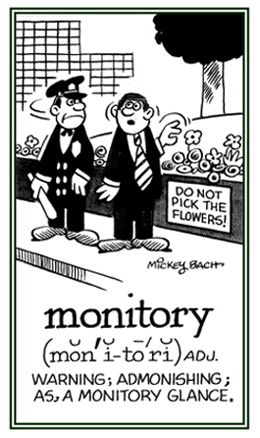monstro-, monstr-, mone-, monu-, moni-
(Latin: monere, to warn; to remind, to advise, to instruct)
The little puppy is very demonstrative with everyone it meets.
2. Involving or characterized by revealing something: The mayor's speech is demonstrative of the financial problems the city is facing.3. In grammar, specifying or singling out the person or thing referred to: The demonstrative pronouns include the following examples: "this", "these", "that", and "those".


Go to this Word A Day Revisited Index
so you can see more of Mickey Bach's cartoons.
2. Marked by a display of feeling.
3. Inclined to display feelings openly.
2. A person who shows an article to a prospective buyer.
3. An instructor, or an assistant, who explains the principles that are being taught or studied: The professor was an expert demonstrator of the procedures required to properly prepare the experiment.
2. A vast amount; especially, of money: Randolph made a mint in oil investments.
3. In philately with reference to a stamp, being in its original, unused condition.
4. Unused or appearing to be newly made and never used: The book was advertised as being in mint condition.
5. Any aromatic herb of the genus Mentha, having opposite leaves and small, whorled flowers, as the spearmint and peppermint.
6. Soft or hard confection, often shaped like a wafer, that is usually flavored with peppermint.
7. Any of various flavored hard candies packaged as a roll of small round wafers.
8. Made or flavored with mint; such as, mint tea.
What does mint (#1 above) have to do with monstro words?
According to legend, during a war when the Romans were hard pressed for the means to carry on their campaign, they appealed to the goddess Juno for aid.
They were told that their cause was just and therefore that their resources would be replenished and made ample for their needs. In appreciation for the victory that followed, we are told, the Romans then erected a temple to Juno, giving it the name Moneta, "the adviser".
It was in this temple, according to historical records, that in the year 269 B.C., silver coins were first produced by the Romans. These coins, from their place of coinage, were henceforth commonly given the name moneta, to distinguish them from the earlier copper coins.
It is from this word, through corruptions in sound and spelling in Old French, that we have obtained both our terms money and mint.
From the uncorrupted Latin moneta came the Latin monetarius, "pertaining to the mint", from which we have derived our word monetary.
2. A fee paid to a mint by a government for minting its coins.
3. Coins made in a mint, especially a quantity of coins minted at the same time.
4. Coins collectively.
2. Of or relating to a nation's currency or coinage.
2. To coin money: The central banks of the country decided to monetize, or print banknotes, in order to make them safer from counterfeiting!
3. To convert an asset, for example, into currency that can be used to purchase goods and services: Jane monetized her estate to use as security for a loan from the bank.
2. The official currency, coins, and negotiable paper notes issued by a government.
3. Assets and property considered in terms of monetary value; wealth.
4. Etymology: "mint, coinage, metal currency", from Old French moneie, from Latin moneta, "mint, coinage"; from Moneta, a cult title of the goddess Juno, in or near whose temple at Rome money was coined; perhaps from monere, "to advise, to warn" with the sense of referring to the "admonishing goddess".
Moneta, a name related to the goddess Juno
One of the epithets of the goddess Juno, the wife of Jupiter in Roman mythology, was Moneta.
When the Romans established a mint at the temple of Juno Moneta, this epithet, or name, became a generic Latin term for a place where money is made. The English words mint and money are both derived from Latin moneta.
The considerable difference between the two words may be accounted for by the widely different routs by which each came into English.
Mint has been proven to have existed in Old English in the form of mynet, and has been in the language since it first developed there and it comes from a primitive Germanic borrowing from Latin moneta which is also the source of Old High German munizza, "coin".
In Middle French, Latin moneta became moneie, which was then borrowed into Middle English in the form moneye and from which we now have incorporated the word "money".
Another version regarding the origin of the word "money"
In Roman mythology, Juno Regina was supposed to be the wife of Jupiter and queen of the heavens. Juno assumed many characters and had a host of divine responsibilities.
She watched over women, protected maidenhood, guided girls through the rites of marriage and she was the savior, the war-goddess, and the moon-goddess; however, most important of all, she was the goddess of warning.
The Romans were so grateful to Juno for telling them about the dangers ahead on various occasions that they built a temple to her on the Capitoline Hill and when coinage was devised, they set their mint in her temple, and as Juno Moneta, the goddess became the guardian of finances.
Her name Moneta was derived from the Latin word moneo, "warn", and finally entered Old French as moneie; and therefore, eventually became our word money.
Through another path, this same word, moneta, came into Old English as mynet, which finally was transformed into the word mint, that place where money is made.

Go to this Word A Day Revisited Index
so you can see more of Mickey Bach's cartoons.
Monsters are often featured in folklore and fairy tales as evil creatures resembling a mixture of different animals.
Primarily used in medical references to a fetus or an infant with substantial physical abnormalities considered by some to be like a "monster".
"Regardless of the form a monster takes, all monsters have one thing in common: they are all awe-inspiring, even frightening, by virtue of some aspect of their physicality or personality.
In fact, the word monster comes from the Latin monstrum, meaning "an evil omen" which in turn seems to be a derivative of the verb monere, "to warn, to remind".
Another perspective regarding monster
Any sign thought to have been given by the old roman gods, that is, any strange incident or wonderful appearance, was taken as a warning, a belief that the gods were provoked or upset.
The sign prophesied the approach of a calamity or misfortune, of public a nature, or to the nation as a whole; rather than to an individual.
Such a foreboding omen, or portent, was called a monstrum; which always, from the nature of the strange incident, denoted the approach of some catastrophe.
The term was derived from the verb monstro, "to show", or "to point out"; familiar to us in the derivative, demonstrate. Through the dread inspired by the term monstrum, that word also came to be applied to whatever was the "fearful thing", the "strange appearance of an unusual and frightening form", which was considered to be an "omen of evil".
Even among the Romans, monstrum, which became monster in English, was used also for anything abnormally large, or of unusual or frightening appearance.


